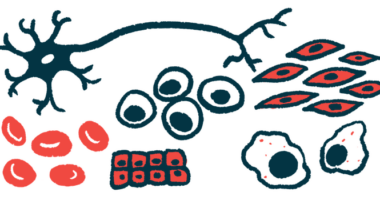Top 10 ALS Stories of 2021

ALS News Today brought you daily coverage of the latest scientific breakthroughs and clinical research related to amyotrophic lateral sclerosis (ALS) throughout 2021.
We look forward to continuing to report for the ALS community in 2022. Here are the 10 most-read ALS news articles of the last year, with a brief description of what made them relevant for the ALS community.
No. 10 — “#MDA2021 — Long-term Use of AMX0035 of Aid in Rapidly Advancing Disease”
In March, Amylyx Pharmaceuticals announced long-term results from the CENTAUR Phase 2/3 clinical trial (NCT03127514) and its extension study investigating AMX0035 in adults with newly diagnosed, rapidly progressing ALS.
The therapy — an investigational combination of two small molecules (tauroursodeoxycholic acid and sodium phenylbutyrate), designed to prevent nerve cell death in ALS — significantly lowered the risk of death and the need for permanent ventilation and hospitalization by 44%.
Top-line results had also revealed that AMX0035 significantly slowed patients’ decline in functional ability, as measured with the ALS functional rating scale-revised (ALSFRS-R).
No. 9 — “Amylyx Plans to File for Approval of AMX0035 in US”
After extensive discussions with the U.S. Food and Drug Administration (FDA), Amylyx announced plans to submit AMX0035 for approval in the U.S. This was a U-turn from the agency’s previous decision, which had initially requested an additional placebo-controlled trial before considering approving AMX0035.
The FDA reversed course following a petition from the ALS Association and I AM ALS, signed by more than 50,000 people, which called on the agency to approve AMX0035 based on the CENTAUR results.
No. 8 — “Arimoclomol Fails to Show Efficacy in Phase 3 Trial, Topline Data Show”
A Phase 3 clinical trial testing Orphazyme’s investigational oral therapy arimoclomol failed to meet its primary and key secondary goals. In other words, therapy did not significantly slow the decline in functionality, nor did it extend survival, and changes in lung function decline or time to permanent ventilation were also not significantly different from patients on a placebo.
Arimoclomol is designed to increase the production of heat-shock proteins, which stabilize misfolded proteins and help them acquire their normal shape, or direct the removal of the abnormal proteins when folding is not feasible. The ORARIALS-01 trial (NCT03491462) investigated about 1.5 years of arimoclomol in 245 adults with recently diagnosed ALS.
No. 7 — “Phase 3 Trial of Stem Cell Therapy NeuroNata-R Enrolling in Korea”
In late March, we reported that a Phase 3 clinical trial was recruiting ALS patients to evaluate the safety and effectiveness of NeuroNata-R (lenzumestrocel), a stem cell therapy conditionally approved to treat ALS in South Korea.
The ALSummit trial (NCT04745299), which was approved by the FDA and is still recruiting participants, aims to enroll about 115 patients in South Korea to support a full approval in Korea and a potential approval in the U.S.
NeuroNata-R is a stem cell therapy that involves harvesting mesenchymal stem cells (MSCs) from a person’s bone marrow, growing them in a lab, and then administering them into the brain. A Phase 1/2 clinical trial (NCT01363401) showed that the therapy delayed disease progression, as measured by ALSFRS-R, after about six months.
No. 6 — “BrainStorm, FDA Discuss Plans for Manufacturing of NurOwn”
Early in the year, BrainStorm Cell Therapeutics met with the FDA to discuss the company’s planned process for what manufacturing NurOwn commercially might look like.
NurOwn involves collecting MSCs from a person’s bone marrow, then growing and differentiating them into cells that produce neurotrophic factors, which are signaling molecules that promote the growth and survival of nerve cells.
No. 5 — “NurOwn Showed No Benefit Over Placebo in Trial, FDA Says”
BrainStorm conducted a Phase 3 clinical trial (NCT03280056) testing NurOwn against placebo in 189 people with ALS. Top-line results, announced late in 2020, showed that the investigational medication did not significantly reduce the rate of disease progression.
A few weeks after the meeting, the FDA announced that the small, nonsignificant difference in disease progression rates seen in the trial likely was due to chance, though the agency left the door open for future trials and development of NurOwn. Recent analyses of data from the Phase 3 trial have suggested that the experimental treatment may benefit patients with less severe disease.
No. 4 — “CNM-Au8 May Be Source of Motor Neuron Gains Being Seen in Phase 2 Trial”
In January, Clene Nanomedicine announced that 40% of patients in its RESCUE-ALS Phase 2 trial (NCT04098406) had improvements in motor neuron health. The trial tested CNM-Au8 — a suspension of nanocrystalline gold designed to increase energy production in nerve cells — in 45 people with early ALS.
However, since the trial was still blinded at the time, it was unknown whether these benefits were due to CNM-Au8. Results from the trial, announced in November, showed that CNM-Au8 did not significantly prevent motor neuron loss and lung function decline compared with placebo, though some “encouraging” trends were seen.
No. 3 — “Compound Reverses Motor Neuron Damage in ALS Mice”
Scientists at Northwestern University in Illinois found that an investigational compound called NU-9 reduced damage to upper motor neurons, which are movement-controlling nerve cells that originate in the brain and are damaged in ALS.
The compound was tested in two mouse models of ALS caused by genetic mutations — one mutation affecting the protein SOD1, and another affecting the protein TDP-43. After treatment, animals had similar numbers and health of upper motor neurons as healthy mice and performed similarly on motor function tests.
No. 2 — “Higher ‘Good’ Cholesterol Levels Appear to Lower Risk of ALS”
Researchers in the U.K. conducted an analysis of over half a million people and found that individuals with higher levels of HDL had a significantly lower risk of ALS, whereas those with high LDL levels were at greater risk of developing the disease.
HDL, or high-density lipoprotein, is a form of cholesterol in the blood that’s sometimes referred to as “good” cholesterol because it is associated with a lower risk of certain health conditions, particularly heart disease. By contrast, low-density lipoprotein or LDL is often called “bad” cholesterol because it is tied to an increased risk of heart disease.
No. 1 — “Global Phase 3 Trial of AMX0035 to Enroll 600 ALS Patients, Amylyx Says”
Our most-read article of 2021 concerned the PHOENIX Phase 3 trial (NCT05021536), which was launched to confirm the positive results from the CENTAUR trial. Amylyx announced that PHOENIX would enroll up to 600 people with ALS diagnosed within the last two years and test AMX0035 against placebo for 48 weeks (about 11 months).
The trial is recruiting participants at 65 sites in the U.S. and Europe. Its main goal is to determine the effect of treatment on participants’ functionality, measured via ALSFRS-R. Dosing in PHOENIX began in November.







